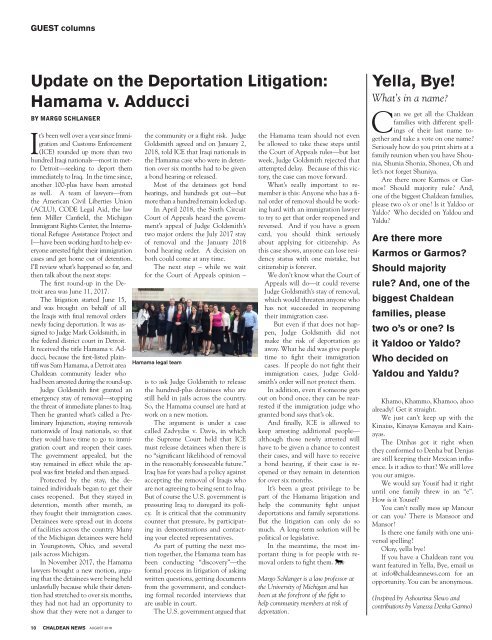AUGUST 2018
cn0818_0144
cn0818_0144
Create successful ePaper yourself
Turn your PDF publications into a flip-book with our unique Google optimized e-Paper software.
GUEST columns<br />
Update on the Deportation Litigation:<br />
Hamama v. Adducci<br />
BY MARGO SCHLANGER<br />
It’s been well over a year since Immigration<br />
and Customs Enforcement<br />
(ICE) rounded up more than two<br />
hundred Iraqi nationals—most in metro<br />
Detroit—seeking to deport them<br />
immediately to Iraq. In the time since,<br />
another 100-plus have been arrested<br />
as well. A team of lawyers—from<br />
the American Civil Liberties Union<br />
(ACLU), CODE Legal Aid, the law<br />
firm Miller Canfield, the Michigan<br />
Immigrant Rights Center, the International<br />
Refugee Assistance Project and<br />
I—have been working hard to help everyone<br />
arrested fight their immigration<br />
cases and get home out of detention.<br />
I’ll review what’s happened so far, and<br />
then talk about the next steps:<br />
The first round-up in the Detroit<br />
area was June 11, 2017.<br />
The litigation started June 15,<br />
and was brought on behalf of all<br />
the Iraqis with final removal orders<br />
newly facing deportation. It was assigned<br />
to Judge Mark Goldsmith, in<br />
the federal district court in Detroit.<br />
It received the title Hamama v. Adducci,<br />
because the first-listed plaintiff<br />
was Sam Hamama, a Detroit area<br />
Chaldean community leader who<br />
had been arrested during the round-up.<br />
Judge Goldsmith first granted an<br />
emergency stay of removal—stopping<br />
the threat of immediate planes to Iraq.<br />
Then he granted what’s called a Preliminary<br />
Injunction, staying removals<br />
nationwide of Iraqi nationals, so that<br />
they would have time to go to immigration<br />
court and reopen their cases.<br />
The government appealed, but the<br />
stay remained in effect while the appeal<br />
was first briefed and then argued.<br />
Protected by the stay, the detained<br />
individuals began to get their<br />
cases reopened. But they stayed in<br />
detention, month after month, as<br />
they fought their immigration cases.<br />
Detainees were spread out in dozens<br />
of facilities across the country. Many<br />
of the Michigan detainees were held<br />
in Youngstown, Ohio, and several<br />
jails across Michigan.<br />
In November 2017, the Hamama<br />
lawyers brought a new motion, arguing<br />
that the detainees were being held<br />
unlawfully because while their detention<br />
had stretched to over six months,<br />
they had not had an opportunity to<br />
show that they were not a danger to<br />
the community or a flight risk. Judge<br />
Goldsmith agreed and on January 2,<br />
<strong>2018</strong>, told ICE that Iraqi nationals in<br />
the Hamama case who were in detention<br />
over six months had to be given<br />
a bond hearing or released.<br />
Most of the detainees got bond<br />
hearings, and hundreds got out—but<br />
more than a hundred remain locked up.<br />
In April <strong>2018</strong>, the Sixth Circuit<br />
Court of Appeals heard the government’s<br />
appeal of Judge Goldsmith’s<br />
two major orders: the July 2017 stay<br />
of removal and the January <strong>2018</strong><br />
bond hearing order. A decision on<br />
both could come at any time.<br />
The next step – while we wait<br />
for the Court of Appeals opinion –<br />
Hamama legal team<br />
is to ask Judge Goldsmith to release<br />
the hundred-plus detainees who are<br />
still held in jails across the country.<br />
So, the Hamama counsel are hard at<br />
work on a new motion.<br />
The argument is under a case<br />
called Zadvydas v. Davis, in which<br />
the Supreme Court held that ICE<br />
must release detainees when there is<br />
no “significant likelihood of removal<br />
in the reasonably foreseeable future.”<br />
Iraq has for years had a policy against<br />
accepting the removal of Iraqis who<br />
are not agreeing to being sent to Iraq.<br />
But of course the U.S. government is<br />
pressuring Iraq to disregard its policy.<br />
It is critical that the community<br />
counter that pressure, by participating<br />
in demonstrations and contacting<br />
your elected representatives.<br />
As part of putting the next motion<br />
together, the Hamama team has<br />
been conducting “discovery”—the<br />
formal process in litigation of asking<br />
written questions, getting documents<br />
from the government, and conducting<br />
formal recorded interviews that<br />
are usable in court.<br />
The U.S. government argued that<br />
the Hamama team should not even<br />
be allowed to take these steps until<br />
the Court of Appeals rules—but last<br />
week, Judge Goldsmith rejected that<br />
attempted delay. Because of this victory,<br />
the case can move forward.<br />
What’s really important to remember<br />
is this: Anyone who has a final<br />
order of removal should be working<br />
hard with an immigration lawyer<br />
to try to get that order reopened and<br />
reversed. And if you have a green<br />
card, you should think seriously<br />
about applying for citizenship. As<br />
this case shows, anyone can lose residency<br />
status with one mistake, but<br />
citizenship is forever.<br />
We don’t know what the Court of<br />
Appeals will do—it could reverse<br />
Judge Goldsmith’s stay of removal,<br />
which would threaten anyone who<br />
has not succeeded in reopening<br />
their immigration case.<br />
But even if that does not happen,<br />
Judge Goldsmith did not<br />
make the risk of deportation go<br />
away. What he did was give people<br />
time to fight their immigration<br />
cases. If people do not fight their<br />
immigration cases, Judge Goldsmith’s<br />
order will not protect them.<br />
In addition, even if someone gets<br />
out on bond once, they can be rearrested<br />
if the immigration judge who<br />
granted bond says that’s ok.<br />
And finally, ICE is allowed to<br />
keep arresting additional people—<br />
although those newly arrested will<br />
have to be given a chance to contest<br />
their cases, and will have to receive<br />
a bond hearing, if their case is reopened<br />
or they remain in detention<br />
for over six months.<br />
It’s been a great privilege to be<br />
part of the Hamama litigation and<br />
help the community fight unjust<br />
deportations and family separations.<br />
But the litigation can only do so<br />
much. A long-term solution will be<br />
political or legislative.<br />
In the meantime, the most important<br />
thing is for people with removal<br />
orders to fight them.<br />
Margo Schlanger is a law professor at<br />
the University of Michigan and has<br />
been at the forefront of the fight to<br />
help community members at risk of<br />
deportation.<br />
Yella, Bye!<br />
What’s in a name?<br />
Can we get all the Chaldean<br />
families with different spellings<br />
of their last name together<br />
and take a vote on one name?<br />
Seriously how do you print shirts at a<br />
family reunion when you have Shounia,<br />
Shunia Shonia, Shonea, Oh and<br />
let’s not forget Shuniya.<br />
Are there more Karmos or Garmos?<br />
Should majority rule? And,<br />
one of the biggest Chaldean families,<br />
please two o’s or one? Is it Yaldoo or<br />
Yaldo? Who decided on Yaldou and<br />
Yaldu?<br />
Are there more<br />
Karmos or Garmos?<br />
Should majority<br />
rule? And, one of the<br />
biggest Chaldean<br />
families, please<br />
two o’s or one? Is<br />
it Yaldoo or Yaldo?<br />
Who decided on<br />
Yaldou and Yaldu?<br />
Khamo, Khammo, Khamoo, ahoo<br />
already! Get it straight.<br />
We just can’t keep up with the<br />
Kinaias, Kinayas Kenayas and Kainayas.<br />
The Dinhas got it right when<br />
they conformed to Denha but Denjas<br />
are still keeping their Mexican influence.<br />
Is it adios to that? We still love<br />
you our amigos.<br />
We would say Yousif had it right<br />
until one family threw in an “e”.<br />
How is it Yousef?<br />
You can’t really mess up Manour<br />
or can you? There is Mansoor and<br />
Mansor?<br />
Is there one family with one universal<br />
spelling?<br />
Okay, yella bye!<br />
If you have a Chaldean rant you<br />
want featured in Yella, Bye, email us<br />
at info@chaldeannews.com for an<br />
opportunity. You can be anonymous.<br />
(Inspired by Ashourina Slewo and<br />
contributions by Vanessa Denha Garmo)<br />
10 CHALDEAN NEWS <strong>AUGUST</strong> <strong>2018</strong>

















